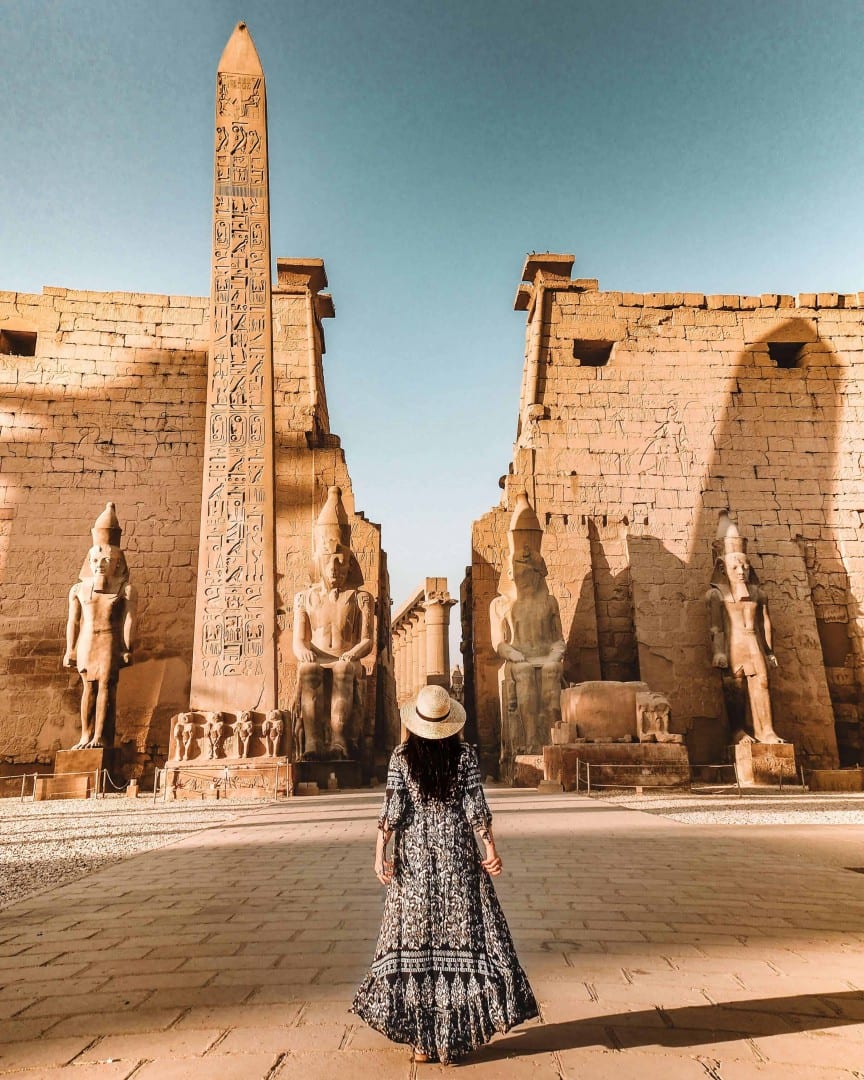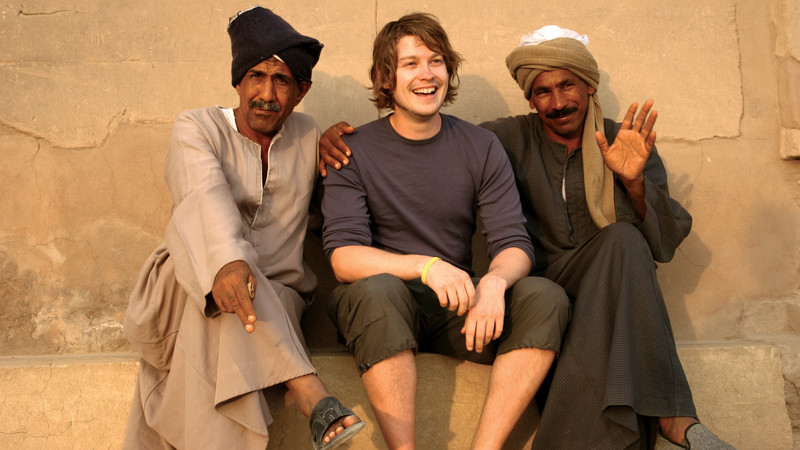Taking Pictures
Egypt of course has codified laws. That is the purview of Egyptian lawyers, more so than the general public. For life in the streets, Egyptians hold to a sense of what is acceptable and what is not. Socially negotiated codes of conduct take priority in public life over written laws, because Egypt's first and foremost law is simply Do not offend the people. So if you are wearing something that people might find offensive, like a t-shirt with a swear word, should people get upset, you are breaking the law. Similarly, if you photograph someone in particular without their permission and they're offended, you've broken the law by virtue of the fact that your actions have offended that person.
So the first rule of photography in Egypt is, don't offend the people. If you photograph people, always ask for permission. If you are traveling with Egyptian friends, they'll be glad to be in the photos and permission is implied, but other for locals, café goers, and people in streets, don't photography anyone close up without permission. When shooting a street scene or a wide shot with people in it, make sure you announce to someone that you are photographing the scene, not any one person. You can say, "ana ba sawwar al manzar" or you can say it in English and likely someone will understand.
Cellphones vs DSLR cameras.
DSLR cameras are much more conspicuous than cellphone cameras. Thus, you are much less likely to arouse suspicion when you shoot photo or video on cellphone camera. Also, when you shoot with cellphones, everyone assumes you're not zooming. When you shoot with a DSLR people don't really know that, as they don't know your camera or your lens. You can get away with more, if you don't want to be hassled, if you stick to your cellphone, because in crowded places and markets, people won't really notice your phone camera as much as your DSLR.
You can photograph:
Archeological or Historical Sites for Tourism
It doesn't matter whether you're using a big DSLR full frame camera and a big lens or a cellphone camera. You have a green light to take photos at tourist sites.
Go nuts! If people are in the for ground, no problem! it's a tourist site. Everyone's going to be taking pictures in every direction, zoom or no zoom, so you'll be fine. No one should single you out for taking pictures on your phone, and if you're traveling with a DSLR or travel camera, you may need to purchase a ticket for camera photography, but it should be affordable. Sometimes when I travel in Mexico I have to buy a special ticket to shoot with my DSLR. It shouldn't be too pricey.
Cityscapes and River Vistas.
Even with a DSLR camera, you should be fine taking pictures of city views and bodies of water, with no people in the foreground. With cellphone cameras this is less of an issue because cellphone cameras are less noticeable.
| Sultan Hassan Mosque in Darb Al Ahmar, Cairo |
Nature
Both cellphones and DSLRs are fine for this type of photography.
At the beach, in the desert, up in the mountains of St. Catherine, or down the Nile on a cruise, photograph the natural beauty of Egypt all you want. This includes salt baths in Siwa, the white desert, your desert safari adventures, Wadi Degla, and any other explorations you arrange. When out in the desert, just be ware that there are no military bases or installations near by. Stay away photographing anything remotely resembling a base, as there are many on the road to these national parks or nature preserves.
Hotels and "Nice Places"
Cellphones and DSLRs are both fine for this type of photography, but you may want to check with hospitality staff to confirm permission.
No one in Egypt will mind you photographing a fancy hotel, resort, or any place that people in charge are proud of, assuming that any people in frame are okay with being included. Because fancy hotels and other luxury projects are considered "nice places" i.e. they show a positive image of Egypt, photography will be welcomed.
 |
| The iconic Marriot Hotel in Zamalek which used to be a palace of Khedive Ismael, Ruler of Egypt 1863-1879 |
Don't photograph list:
No Government Buildings or Residential Buildings
Any administrative building is off limits for photography, whether it's a court house, city hall, state security building, or even a police station. Any modern building that is not a hotel or a mall is usually either a municipal building or a residential building. Lots of buildings are mixed use for commercial and residential. When photographing residential buildings, you'll find that people are concerned that you may capture the private lives of people through their windows. Lots of times this isn't the case and you are either far away or shooting wide angle, but in any case locals may not know that and may raise concern. With photographing municipal buildings, locals see this as a major security issue, so when in doubt, ask a local if what you see is a municipal building or a residential building, and if it's okay to photograph there.
Don't photograph people you don't know.
If you carry a wide angle lens, be sure to make it clear to people around you that you are photographing a wide area, and not focusing on individuals. Photographing people you don't know in an identifying, portrait manner, is not acceptable. You might find that people get really fussy about that kind of thing. People here also don't know the difference between a Zoom lens and a wide angle. If you have a big lens, people might assume your taking zoomed shots of them. Here it's always better to ask for permission, or explain what you are doing, than beg for forgiveness after someone gets upset.
Don't take pictures of "poor" neighborhoods or "poor people"
The general sentiment is that no one here in Egypt wants to be part of a bad image, one that portrays the poverty or difficult circumstances of Egyptians at this time. As far as photographing neighborhoods are concerned, this is something you should not do if you are alone. If you have a guide or friend from the neighborhood, check with them first. Don't try to capture the state of a slum, a village, or an impoverished urban environment. The locals do not like this type of documentary photography. They don't actually want this state of affairs documented as they are hoping it will soon improve.
 |
| Famous mural project by Tunisian artist El Seed, Found at Manshayet Nasr neighborhood, known as the city of the Zabbaleen, Manshayet Nasr has managed Cairo's garbage disposal for many decades. |
Don't photograph people living in extreme poverty, don't photograph the state of their shelter, their faces or their clothing. In short, no one here in Egypt wants to find themselves the subject of an 'Egyptian poverty' photo series. They may not have a nice situation, but they still have access to the internet, Facebook and Instagram. So it's important to be reflect on how they would feel seeing themselves depicted in this way. These people will speak up if they don't like what you are doing and people will defend them, so best not to offend them. They may not have money but they have more agency for defending their rights than you might expect.
Garbage
I shouldn't have to say this, but don't be seen documenting Egypt's garbage disposal problem. Egypt is suffering from systemic failure of waste disposal systems, (along with political gridlock) on a municipal / national level, and in some places the situation is better than others. Non-the-less if a tourist is observed photographing garbage piles or other evidence of this systemic failure, locals will likely get offended and will confront the Tourist. It is essentially unsafe for a tourist to do this.






Comments
Post a Comment